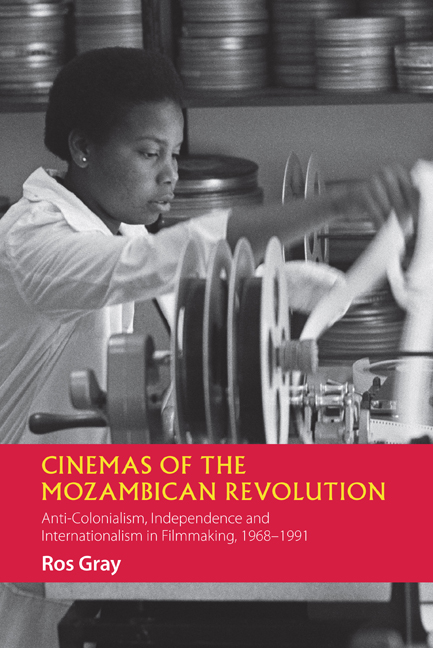 Cinemas of the Mozambican Revolution
Cinemas of the Mozambican Revolution Book contents
- Frontmatter
- Contents
- List of Images
- Acknowledgements
- Glossary
- Abbreviations
- Map of Mozambique
- Introduction
- 1 We Will Win! Filming the Armed Struggle in Mozambique, 1968–1973
- 2 From the Rovuma to the Maputo: Confluences of Independence, 1974–1975
- 3 Birth (of the Image) of a Nation: Delivering Cinema to the People, 1976–1978
- 4 Who Exactly is the Party? Didacticism, the Battle of Information and the Vanguard Party, 1977–1979
- 5 A New Symphony: Cinema and Television in the ‘Decade of Development’, 1980–1984
- 6 Let Them Come! Filmmaking on the Frontline against Apartheid, 1980–1989
- 7 The Time of the Leopards: The End of Socialist Fictions and the Beginnings of the Docu-Drama, 1985–1991
- Conclusion
- Bibliography
- Filmography
- Index
1 - We Will Win! Filming the Armed Struggle in Mozambique, 1968–1973
Published online by Cambridge University Press: 16 July 2020
- Frontmatter
- Contents
- List of Images
- Acknowledgements
- Glossary
- Abbreviations
- Map of Mozambique
- Introduction
- 1 We Will Win! Filming the Armed Struggle in Mozambique, 1968–1973
- 2 From the Rovuma to the Maputo: Confluences of Independence, 1974–1975
- 3 Birth (of the Image) of a Nation: Delivering Cinema to the People, 1976–1978
- 4 Who Exactly is the Party? Didacticism, the Battle of Information and the Vanguard Party, 1977–1979
- 5 A New Symphony: Cinema and Television in the ‘Decade of Development’, 1980–1984
- 6 Let Them Come! Filmmaking on the Frontline against Apartheid, 1980–1989
- 7 The Time of the Leopards: The End of Socialist Fictions and the Beginnings of the Docu-Drama, 1985–1991
- Conclusion
- Bibliography
- Filmography
- Index
Summary
By 1968 the Frente de Libertação de Moçambique (Frelimo) had been operating for six years. It had succeeded in combining regional anti-colonial organisations into a united front and had established headquarters in Dar es Salaam in Tanzania, where the Mozambique Institute provided housing and education for refugees fleeing colonial rule. Some refugees were settled in the south of Tanzania, where Frelimo set up a military training base at Nachingwea, a hospital at Mtwara and a children's education centre at Tunduru. The armed insurrection, which began in 1964, led to the capture of territory in the north of Mozambique, which Frelimo called ‘the liberated zones’. The liberated zones are conjured in the films of the armed struggle made with Frelimo through images of guerrillas marching through the forest, columns of peasants carrying supplies, makeshift health clinics and schools comprising a blackboard hanging from a tree. Their meaning is conveyed in the faces and voices of men and women who describe how the armed struggle was transforming their lives. A new culture of revolutionary nationalism, the films argue, was being created in these sites through the collaboration between Frelimo and local peoples. The unity, discipline and cultural richness of this liberation movement are asserted in first-person accounts and scenes of everyday life, in dances, poetry, sculpture, speeches and songs.
During the armed struggle, filmmakers, photographers, journalists and activists from across the world were invited to see for themselves the base at Nachingwea in Tanzania and the liberated zones in the provinces of Cabo Delgado, Niassa and Tete. As documented in a regular column, ‘Visitors in the Liberated Zones’, in the Frelimo journal Mozambican Revolution, they came from Yugoslavia, the Soviet Union, China, Japan, Western and Eastern Europe, the United States, Algeria and Tanzania. This geographical range indicates the plural approach that Frelimo took during the armed struggle in cultivating alliances across the divisions of the Cold War and the Sino–Soviet split. Frelimo lacked the facilities to make its own films and it did not have the means to distribute and project films in the territories within Mozambique that it controlled. In the long history of revolutionary struggles in the twentieth century, this was not unusual.
- Type
- Chapter
- Information
- Cinemas of the Mozambican RevolutionAnti-Colonialism, Independence and Internationalism in Filmmaking, 1968–1991, pp. 15 - 64Publisher: Boydell & BrewerPrint publication year: 2020


